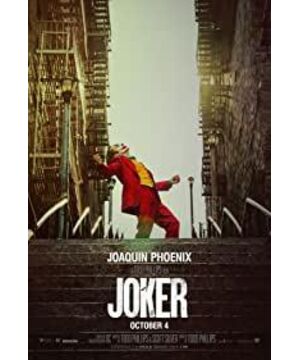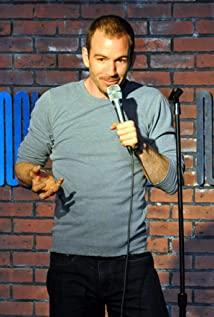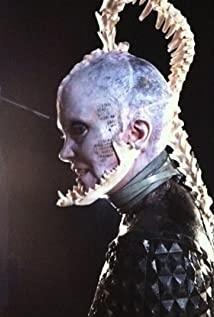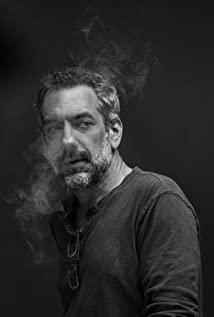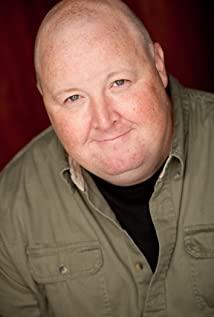It's been a long, long time before I start writing this review. The hype when "Joker" was released has passed, and even the hustle and bustle of the Oscar-winning actor has slowly subsided, but I always feel that since I call myself a DC fan, if It would be a shame not to write this review. Fortunately, I probably don't quite agree with a lot of mainstream opinion, so while what I say below isn't entirely ingenious, at least it's not a cliché that's been repeated a thousand times or an unwarranted compliment.
Spoiler alert
"Joker", the iconic DC villain, is so famous that it has too much aura and history. When people mention him, they will think of his identity as Batman's old enemy, and they will think of his bad deeds Think of the chemical pool, think of Harry, think of uncontrollable laughter, think of green hair, purple suit, think of Jack Nicholson, think of Heathley Jay, think of Jerry Leto, now, people think of Joaquin Phoenix.
Such a natural association, of course, is a manifestation of the character's popularity. We can feel the influence of such a boom from the film's final global box office. You can say that this global billion-dollar The box office is due to Joaquin's ingrained performance, or because of this somewhat sensitive subject, but believe me, if it weren't for the dazzling halo of "Joker", people would never have paid such a high degree of attention to this film or is to look forward to.
Therefore, I actually hope that when you watch this film, you will let go of some preconceived ideas, whether it is anti-elite or the character of the clown itself, etc., everyone is interested in the film's rebellious thoughts and evil beings. The process of the birth of catalysis, but as far as I can see, even though this film involves those contents, the core must be the concern for such vulnerable groups in society.
The example of the clown is just to say when we stop paying enough attention to the mentally ill or the bottom group in society, they will eventually degenerate.
This "unrecognized vulnerable group" can be a gay black man, or a teenage girl who has an unintended pregnancy and nowhere to get an abortion... In this film, this vulnerable group just happens to be Arthur Fleck, who eventually turns into a clown of the mentally ill.
1. The big rat, the big rat, the no-eating my millet. When a person is on the verge of collapse, the causes must be multi-faceted, and the social environment is undoubtedly the most hidden part and the most easily overlooked part.
At the beginning of the film, with Arthur's make-up, the radio in the background points out the situation in Gotham that day: "Because of the strike of the garbage handlers, the piles of garbage on the streets are increasing day by day, and the streets are filled with decay. The stench and the hordes of mice"
Gotham in "Joker" is already on the verge of a delicate collapse: strikes, dirty environment, government inaction... And the people in it, especially the people at the bottom, you can imagine To how bad the environment they live in is like the "smell of people at the bottom" repeatedly mentioned in "Parasite". living life.
Shortly after the opening, Arthur, who was sitting on the bus, couldn't hold back his untimely laugh, and handed a card to the puzzled black woman: he had symptoms of uncontrollable laughter.
In my opinion, this is the most important scene in the early part of the movie. It shows the fact that Arthur suffers from the disease. At the same time, this card of Arthur also shows that he still cares about the opinions of others and himself. a little dignity. This card may not change a thing, but even if one person sees the card and forgives Arthur's behavior of laughing a little, he can get a little consolation.
Arthur's efforts to control his illness were ultimately in vain as the government cut back on spending.
Periodic psychological counseling, whether it works or not, whether he is really understood or not, at least one person is listening, and Arthur also has the opportunity to have some simple exchanges. What's more important is the medicine provided by the government. Those pills to relieve symptoms kept Arthur's spirit in a normal state, but when the regular psychological counseling was withdrawn and the medicine was nowhere to be found, Arthur was actually a man. unilaterally abandoned by the government. Those people know that for these people with hidden mental illness, lack of proper attention and treatment will only make their mental state worsen, but who really cares about these vulnerable people? They can be mentally ill, the big deal is being arrested in a mental hospital, and trying their best to ensure the normal life of these people, it is better to save the money and invest in the campaign for mayor.
Therefore, in this film as I understand it, the main focus must be on the concern for such "vulnerable groups who cannot speak out on weekdays". We can imagine that such "abandoned" patients must exist in large numbers in American society. If Given the right amount of counseling and medication, they have the chance to live a normal life like most people, but if society as a whole treats them with indifference, contempt, or just indifference, they are equally likely to fall The abyss of insanity, become a criminal.
2. The King of Comedy
I can't help but compare "Joker" with Martin Scorsese's "Taxi Driver" and "King of Comedy", the film undoubtedly draws a lot of the essence of those two films, both in motif and form. There are obvious signs of homage.
"Taxi Driver" discusses the story of a person "on the edge", very similar to the clown. After witnessing the darkness of the city and experiencing various setbacks, the protagonist as a taxi driver gradually has spiritual problems. There is a scene in the movie that left a deep impression on me. The protagonist stepped on the TV cabinet, and the TV cabinet was in a crumbling state. This was the mental state of the protagonist at that time. He could choose to assassinate the presidential candidate, or he could choose to be a good person. , as he did at the end, all he needed was a nudge.
Apparently Arthur also went through such a process in "Joker", and there is also a scene in the movie that shows this kind of crisis situation "on the edge", which is the Chaplin movie he plays when he walks into the theater, Chaplin's The character skates blindfolded, repeatedly approaching the cliff. In the eyes of the majority of the audience, this approaching cliff can actually bring them a thrilling feeling, so at this time, we who watched "Joker" also became spectators who appreciated Arthur's approach to the edge.
It's a pity that when Arthur was crumbling, he didn't get much help from the power, and even the "hypocritical father" he hoped could not help him. The part where Arthur meets Thomas Wayne deserves a good discussion.
When Arthur came to testify about his father, Thomas immediately denied that, as far as the whole film is concerned, Thomas may indeed not think that he is Arthur's father, but is Thomas's approach really reasonable? Thomas made some explanations in that clip, but he kept mentioning things like "Do you want money?" For Arthur, what he expected was not just money, but also respect, and respect. Attention, being loved, but thinking these are things Arthur could never get from Thomas, so he burst into laughter and was left alone in the toilet after being punched in the bridge of the nose.
So after that, the speed at which Arthur fell into the abyss began to increase suddenly.
On the other hand, let's take a look at the similarities between this film and The King of Comedy.
"The King of Comedy" starred by De Niro in 1982, although the domestic popularity is much lower than "Taxi Driver", but I think this work is even better to some extent, the film describes a person who has always wanted to perform on stage. The hero of the film kept going to the TV station in hopes of being on camera. After being rejected, he finally kidnapped the host and used it as a threat for a five-minute solo show.
It's easy to see that "The Clown" is the successor to "The King of Comedy". He also hopes to be on the camera, and finally successfully appeared on the camera and caused controversy. In "The King of Comedy", there are also many male protagonists who fantasize about being on camera. Said that De Niro played the role of host directly in "Joker".
Like "The King of Comedy", Murray, the host of "Joker", is a character with double meaning to Arthur. On the positive side, Murray's success makes Arthur constantly look forward to performing on stage, and It is imagined that the "kind" Murray will be considerate of his past and will greatly appreciate his performance. However, the real Murray is not as beautiful as Arthur imagined. He will make fun of others for attention. To ridicule others, the sadness of those at the bottom, such as the "giant mouse", will become a joke he can easily come up with, and Arthur's embarrassing small theater appearance is even played repeatedly by him as a laughing stock.
So such a denial from someone he admired made Arthur's inner anger burn more and more vigorously. Arthur, who had no drug control and constantly tasted a sense of relief after killing people, finally convinced Murray on the show. He didn't care, so Arthur, who had planned to commit suicide, shot Murray down.
When we carefully analyze these two bridges, we can still find that the theme of the film is absolutely closely related to the concern for the people at the bottom. Thomas didn't care about Arthur's feelings, only worried about whether he would be blackmailed; Murray didn't care about Arthur's mental state, he just said "politically correct" words, they lacked basic concern for the lower classes , and being shot to death is the result of the chain reaction caused by this "inattentiveness".
3. What is home
Arthur lives with his mother, and a big turning point in the movie is when Arthur finds out that his mother cheated on him, that Arthur was adopted by his mother, and turns a deaf ear when his boyfriend abuses Arthur. Fantasy Arthur is actually her and Thomas' illegitimate child.
Therefore, when the film focuses on the life of the people at the bottom, it also pays attention to their family environment. Although social pressure, the attitude of the elites and the attention of the public have a great impact on their lives, but if these children who grow up in predicament If you can get proper education and grow up in a relatively positive environment, then many mental problems when you grow up can actually be avoided. However, these lower-level families often also lose this link of proper education for their children, and children grow up in deformed conditions. values, then there is a greater possibility of psychological problems.
Of course, the last pillar of Arthur's mind is the shattering of his fantasy girlfriend. At the first glance in the corridor, because this woman did not speak ill of Arthur, Arthur had a lot of thoughts about her, and with the drug , the delusion deepened, until the truth finally came out.
As a result, Arthur's world finally collapsed completely. Under the neglect of society, the malice of the elite, and the betrayal of his family, the original psychological problems burst into hatred and anger. Since then, Arthur has hardly deliberately suppressed the plot. Your own emotions, you will find that he no longer has uncontrollable laughter, because that is an abnormal self-protection when he is sad and painful, when you lose everything, every step is a walk in hell, There's nothing left to lose, and no more grief.
It is worth noting that even if Arthur did not suppress the restlessness in his heart, he was not completely out of control. After Arthur killed the fat man in the company, he did not kill the dwarf. The dwarf did not make fun of him. On the contrary, the little dwarf was still the character who was made fun of by everyone else in the company. His life was perhaps even more miserable than that of Arthur.
4. The Elephant in the Fridge
My opinion on this film will probably come to an end after I write it here, and then I will talk about political metaphors, about the burial of DC Easter eggs, about the demons born in the continuous downward situation, about the impact of fantasy and reality on the outlook on life, etc. , I believe that others have made detailed comments long ago, so I won't repeat my humble opinion here. I just want to use the plot of Arthur getting into the refrigerator as an ending.
There was such a joke in the sketches of Zhao Benshan and Song Dandan in the Spring Festival Gala.
How many steps does it take to put an elephant in the refrigerator?
Step three, open the refrigerator door, put the elephant in, and close the refrigerator door.
How many steps does it take to put a giraffe in the refrigerator?
Four steps, because the elephant has to be taken out.
But no one wanted to go into the fridge anymore, so Arthur never came out again.
In Gotham City, no one will pay attention to the state of a mentally ill person at the bottom of the United States, no one will ask him where he has gone, no one will think that he hides in order to avoid the malice of this world and to suppress his restless heart without medicine. refrigerator.
In that cold, dark space where oxygen was gradually consumed and slowly suffocated, if even one person stretched out his hand, maybe things would not be so bad. But nobody in the movie does that, so things can't be undone.
But in reality, we may still have a chance to give them even the tiniest attention and even a little bit of warmth to those lost souls who are on the verge of collapse, and maybe they can save more than one life.
If someone does this, it means that the movie "Joker" is worth making. A good movie, in addition to making people watch it, must also have a warning for society and life.
View more about Joker reviews


